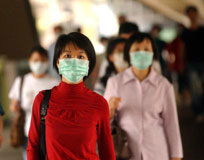
| News
Reports |
|||||
 |
Transfer
Merits Buddhists do not celebrate festivals by enjoying themselves in merry-making. They would practice charity and help others to relieve themselves from their sufferings, especially those suffering from the deadly SARS virus. |
||||
| Thus Than Hsiang Temple recently held an observation of vegetarian diet for nine days commencing 12th May. The Wesak week celebration ended with a blessing session by way of sutra chanting on 21st May. All merits accrued from this meritorious act was transferred to all those suffering from SARS.
|
|||||
| Below is an excerpt courtesy from 'The Star' newspaper dated 23rd May (Friday), Metro Section, Seeking Divine help to fight SARS BY
Ng Su-Ann Its abbot Ven. Wei Wu said the temple had encouraged its devotees to observe a nine-day vegetarian diet between May 12 and May 20 in conjunction with the Wesak Day celebration. “After the nine days, we held a half-hour prayer at 5.30am to transfer their merits towards the eradication of SARS worldwide. In Buddhism, we believe that the outbreak is the result from an accumulation of bad karma,” he said in an interview. Ven. Wei wu said the public must maintain personal hygiene and have a balanced diet in order to prevent SARS. On the spiritual side, the emphasis was on practicing calmness and compassion, he added. He said the temple held a public talk three weeks ago on SARS to promote awareness on the disease’s symptoms and preventive measures. A videotape of the talk was shown at the temple’s canteen for its customers at lunchtime throughout the nine days, he said, adding that the canteen served vegetarian food daily from 8am to 9pm. He said highlights of the talk were featured at the temple’s website at www.thanshiang.org. “In a crisis like this, we believe that education is very important to counter mass panic and rumour mongering. I receive an average of five emails a day on SARS. And it is quite worrying that some of them contain wrong or inaccurate information,” he said. Some 20 devotees including the temple’s staff, monks and senior citizens tool part in the special prayer session at the Great Compassion Hall where a 1.8m image of Kuan Yin (the Goddess of Mercy) stood. During this session, a piece of paper containing a prayer for the speedy recovery of all SARS patients worldwide was burnt as a symbolic gesture.
|
|||||
|
|||||
|
|||||
| Thank
you for reading the Than Hsiang E-zine. Unsubscribe I Subscribe I Change subscription |
|||||